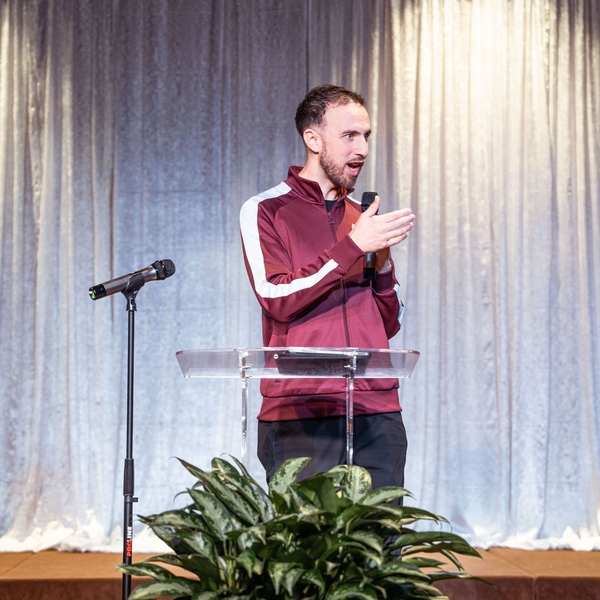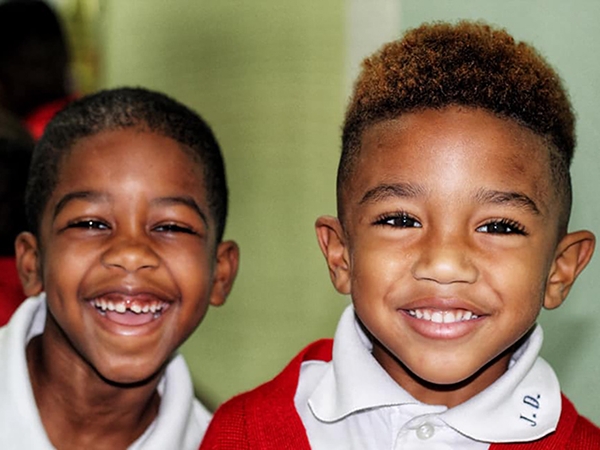TSU's Board Chairman Brandon L. Simmons Featured at 2024 Convocation for The Imani School

Texas Southern University Board of Regents Chairman, Brandon L. Simmons, served as the honored guest speaker for The Imani School's very first convocation. Founded in 1988, The Imani School is the largest and oldest Historically Black Private School in America. It is an institution rooted in excellence, providing an academically rigorous experience for Houston students from pre-K through Middle School.
Chairman Simmons' speech was a beacon of motivation and inspiration for the students, emphasizing the importance of working toward their future careers while staying true to themselves and their faith. His remarks included a call to action, as he encouraged the students to set their sights on the extraordinary opportunities available to them in the economy of the future, especially in the information technology sector.
Chairman Simmons shared personal anecdotes and valuable insights, encouraging the students to dream big and remain steadfast in their beliefs. He highlighted the significance of resilience, perseverance, and integrity in achieving success especially in the tech industry, urging the young minds to harness their potential and make a positive impact on the world.
Adding to the excitement and spirit of the event, the convocation concluded with a dynamic performance by the incredible TSU Ocean of Soul marching band that also featured TSU Cheerleaders. Their lively and energetic display filled the atmosphere with positivity, leaving the students uplifted and inspired.
The convocation was more than just an assembly; it was a celebration of potential and a powerful reminder of the bright futures that lie ahead for the students at The Imani School. The presence of Chairman Simmons and the TSU Ocean of Soul marching band made it an unforgettable occasion, setting a high tone for the academic year and building upon the already strong connections between The Imani and TSU communities.
Faith & Fortitude: How Comprehensive Cultural Education Helps Imani Combat the Achievement Gap

A dynamic primary education has long been regarded as the foundation for a child’s long-term success. At The Imani School — a private, educational institution in the heart of Southwest Houston — exceptional childhood development caters to a niche demographic, providing Christian-based care and education to African American students from six weeks to eighth grade. While private schooling is typically associated with the white and wealthy, Imani has managed to administer an academically rigorous and holistically enriching experience to a completely African American student body for the past three decades, combining the traditional tenets of private education — intimate class sizes, expert faculty, inventive technology, assorted curriculum, and more — with cultural enlightenment and faith-based foundation specifically tailored to children of color.
As one of the only private schools in the country to educate a 100 percent African American student body, Imani’s educational approach counters a mainstream landscape that routinely neglects students of color. According to the National School Board Association, 45 percent of Black students attended high poverty schools, compared with eight percent of white students as recently as 2019; while the National Assessment of Educational Progress has cited a four-year achievement gap between White and Black students.
“Societal efforts to overcome the ill effects of prejudice and discrimination for African Americans have not been effective enough. The achievement gap is a problem not only for African American students and their families and communities; it affects the well-being of the entire country. Researchers have found that the persistence of the educational achievement gap imposes on the United States the economic equivalent of a permanent national recession.” - “Addressing the African American Achievement Gap: Three Leading Educators Issue a Call to Action,” NAEYC
Considering these and other similar statistics, The National Association for the Education of Young Children (NAEYC) — which works to promote high-quality early learning for all young children — took on the task of outlining some of the factors that contribute to the achievement gap between African Americans and White Americans. Below, we dive into three factors from NAEYC’s report and explore how Imani’s comprehensive cultural education combats possible road blocks:
1 | DEVELOPMENT & LEARNING
“Children’s experiences in the social world of family and community play a critical role in what and how well children learn in school. The importance of warm interpersonal relationships cannot be overstated. Adults are needed to provide consistent physical care, social guidance, intellectual stimulation, and emotional support. Children attach to meaningful caregivers and depend on them for physical and emotional security. They identify with, imitate, and begin to internalize their caregivers’ attitudes, values, ways of expressing themselves, and approaches to solving problems; this sets the stage for social, emotional, physical, and cognitive characteristics that in turn affect everything from moral and ethical behavior to manipulative skills and executive functioning.”
In order to foster proper learning and development, Imani offers:
Age Specific Social Emotional Learning rendered by African American Instructors
Parent Activity Groups + Educational Workshops
Holistic Education rooted in faith, self-confidence, and academic excellence
2 | THE ROLE OF CULTURE AND TRADITION
“Teachers who understand the history of slavery, the restrictions of segregation, and the continued injustices encountered by African Americans can better understand African American children’s behavior. In the past, tight-knit family networks and communities of teachers and leaders were better able to support children and buffer the negative messages children received from the larger society. Today, the lack of knowledge about and appreciation for Black culture creates social distance between African Americans and White Americans and is a deterrent to change. The African American culture transmitted from generation to generation needs to be understood as rich and noteworthy, and needs to be used as the entry to new skills and knowledge.”
In order to promote culture and tradition, Imani offers:
African American Studies as Core Curriculum
Speech, Drama Poetry, and Affirmation Practice, which works to further develop the "black child’s self-confidence” as they move through society
Visual & Performing Arts tethered to Diverse Literature and Artists
3 | THE CHALLENGES OF SCHOOL
“Another problem for many African American children is the lack of continuity between the preschool years and the primary grades (Takanishi 2016). Research and school experience have shown the importance of long-term consistency in expectations, high-quality instruction, and social supports if children from low-income homes are to master the challenges of school. In the first several years of their lives, many African American children remain at home or are in child care arrangements in which school prerequisites (e.g., formal literacy and numeracy experiences) and social and emotional support (e.g., responsive teachers) are not a part of daily life.”
In order to combat the challenges of starting school, Imani offers:
Comprehensive Pre Kinder Education
Educational instruction two grades ahead of students' current grade — High Expectations Breeds Superior Performance
Continued education from 6 weeks to 8th grade
To read NAEYC’s full report — which also details recommendations for educators, administrators, and policy makers to help equalize educational opportunities — click here.
